Discover books about the way performers with disabilities see themselves and share performance spaces. Find narratives and testimonies about music, dance, theatre/acting, and multidisciplinary fields.
In this section, you will find links to digital accessible and paper versions of books. Kindle offers reading applications and tools that work with assistive technology and propose settings for all users. The digital version is usually cheaper than the paper version. For each book, you will find Amazon affiliate products, and WorldCat links for universities and libraries.
If you have an idea or a suggestion of product that you think should be added here, don’t hesitate to contact us.
Music
Disability and Music Performance (Interdisciplinary Disability Studies) 1st Edition
by Alejandro Alberto Téllez Vargas (Author)
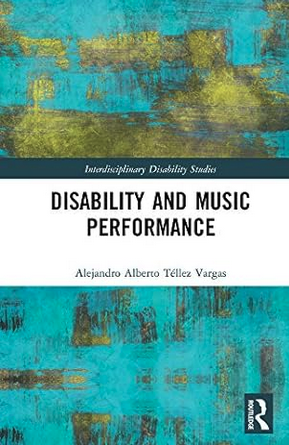
Disability and Music Performance examines discriminatory social practices in music conservatoria, orchestras, music festivals and music competitions, which limit disabled people’s access to music performance at a professional level. Of particular interest are the disabling barriers that musicians with an intellectual, physical, sensory or neurological disability―or an acquired brain injury―encounter in the world of Western classical music, both as students and as professional performers. This book collects data in the form of semi-structured interviews and video and audio recordings to explore the voice, concerns and suggestions expressed by musicians with disabilities. It examines their perceptions of both inclusive and discriminatory practices in music institutions as well as the representation of, and audio-visual recordings by, key musical figures with disabilities. Its findings aim to contribute to the wellbeing of musicians with impairments by challenging disabling social practices that see them as inferior.
Link to the Kindle version: https://amzn.to/42xLDrs
Link to the paper version: https://amzn.to/42PPctz
Link to WorldCat for university students/staff and libraries: https://search.worldcat.org/title/1040592503
Music, Disability, and Society
by Alex Lubet (Author)
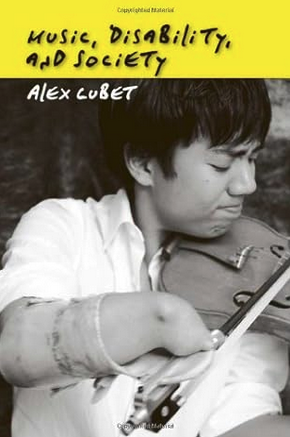
Musical talent in Western culture is regarded as an extraordinary combination of technical proficiency and interpretative sensitivity. In Music, Disability, and Society, Alex Lubet challenges the rigid view of technical skill and writes about music in relation to disability studies. He addresses the ways in which people with disabilities are denied the opportunity to participate in music. Elaborating on the theory of “social confluence,” Lubet provides a variety of encounters between disability and music to observe radical transformations of identity. Considering hand-injured and one-handed pianists; the impairments of jazz luminaries Django Reinhardt, Horace Parlan, and “Little” Jimmy Scott; and the “Blind Orchestra” of Cairo, he shows how the cultural world of classical music contrasts sharply with that of jazz and how musicality itself is regarded a disability in some religious contexts. Music, Disability, and Society also explains how language difference can become a disability for Asian students in American schools of music, limiting their education and careers.
Link to the Kindle version: https://amzn.to/4byW5Du
Link to the paper version: https://amzn.to/3SQfSXA
Link to WorldCat for university students/staff and libraries: https://search.worldcat.org/title/1148161077
Improvising Across Abilities: Pauline Oliveros and the Adaptive Use Musical Instrument (Music and Social Justice)
by Thomas Ciufo (Editor), Abbey L. Dvorak (Editor), Kip Haaheim (Editor), Jennifer Hurst (Editor), Grace Shih-en Leu (Editor), & 8 more
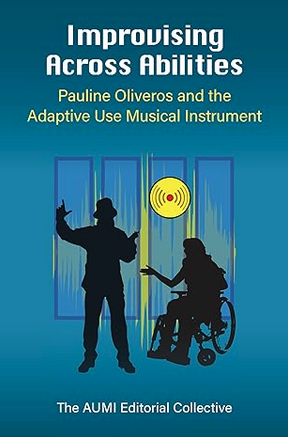
Improvising Across Abilities: Pauline Oliveros and the Adaptive Use Musical Instrument (AUMI) brings together scholars, musicians, and family members of people with disabilities to collectively recount years of personal experiences, research, and perspectives on the societal and community impact of inclusive musical improvisation. One of the lesser-known projects of composer, improviser, and humanitarian, Pauline Oliveros (1932–2016), the AUMI was designed as a liberating and affordable alternative to the constraints of instruments created only for normative bodies, thus opening a doorway for people of all ages, genders, abilities, races, and socioeconomic backgrounds to access artistic practice with others. More than a book about AUMI, this book is an invitation to readers to use AUMI in their own communities.
Link to the Kindle version: https://amzn.to/3HQpnjg
Link to the paper version: https://amzn.to/3SVmy6V
Link to WorldCat for university students/staff and libraries: https://search.worldcat.org/title/1390715774
Shakin’ All Over: Popular Music and Disability
by George McKay (Author)
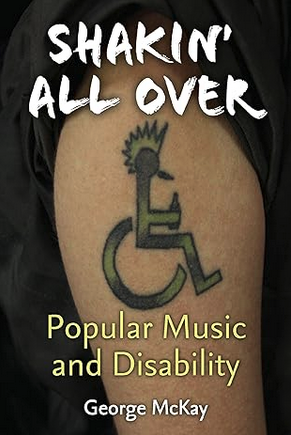
Given the explosion in recent years of scholarship exploring the ways in which disability is manifested and performed in numerous cultural spaces, it’s surprising that until now there has never been a single monograph study covering the important intersection of popular music and disability. George McKay’s Shakin’ All Over is a cross-disciplinary examination of the ways in which popular music performers have addressed disability: in their songs, in their live performances, and in various media presentations. By looking closely into the work of artists such as Johnny Rotten, Neil Young, Johnnie Ray, Ian Dury, Teddy Pendergrass, Curtis Mayfield, and Joni Mitchell, McKay investigates such questions as how popular music works to obscure and accommodate the presence of people with disabilities in its cultural practice. He also examines how popular musicians have articulated the experiences of disability (or sought to pass), or have used their cultural arena for disability advocacy purposes.
Link to the Kindle version: https://amzn.to/3SwlyEN
Link to the paper version: https://amzn.to/3uDA5q6
Link to WorldCat for university students/staff and libraries: https://search.worldcat.org/title/863157473
Bodies in Commotion: Disability and Performance (Corporealities: Discourses Of Disability)
by Carrie Sandahl (Author), Philip Auslander (Author)
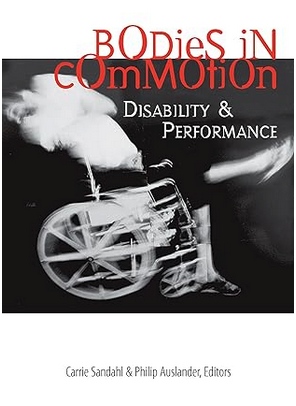
This groundbreaking collection imagines disabled bodies as “bodies in commotion”-bodies that dance across artistic and discursive boundaries, challenging our understanding of both disability and performance. In the book’s essays, leading critics and artists explore topics that range from theater and dance to multi-media performance art, agit-prop, American Sign Language theater, and wheelchair sports. Bodies in Commotion is the first collection to consider the mutually interpretive qualities of these two emerging fields, producing a dynamic new resource for artists, activists, and scholars.
Link to the Kindle version: https://amzn.to/496yqbN
Link to the paper version: https://amzn.to/4bujOEL
Link to WorldCat for university students/staff and libraries: https://search.worldcat.org/title/870402368
Dancing On Your Disabilities: Never Say Impossible to Your Dreams
by Myra Goldick (Author)
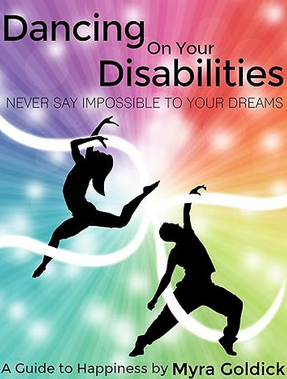
Everybody wants to be happy no matter how old you are, regardless of your cultural background, religion, or gender. Sometimes happiness can be illusive when you are filled with extreme emotional or physical pain and your life long dreams are fading away as you battle a body or mind that simply will not listen to your commands, and your independence starts slipping away. Dancing on Your Disabilities shares my story of how I fought to overcome a life long progressive physical challenge, which began at the age of 10. Within the pages of this book, I demonstrate that happiness is a choice. I explain in a metaphorical sense that you can spiritually dance through life, and why you should “ Never Say “Impossible to your Dreams.”
Link to the Kindle version: https://amzn.to/3SSxulu
Link to the paper version: https://amzn.to/3SrrleA
No WorldCat link
Dance
On My Own Two Feet: From Losing My Legs to Learning the Dance of Life
by Amy Purdy (Author), Michelle Burford (Author)
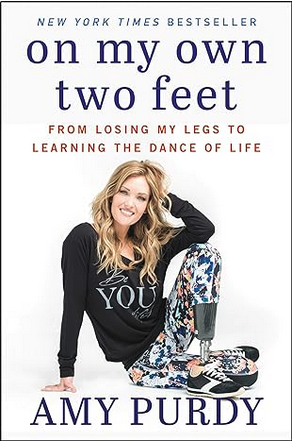
Amy Purdy, who inspired a nation on Dancing with the Stars and has been called a hero by Oprah Winfrey, reveals the intimate details of her triumphant comeback from the brink of death to making history as a Paralympic snowboarder. In this poignant and uplifting memoir, Dancing With the Stars sensation Amy Purdy reveals the story of how losing her legs led her to find a spiritual path. When the Las Vegas native was just nineteen, she contracted bacterial meningitis and was given less than a two percent chance of survival. In a near-death experience, she saw three figures who told her: “You can come with us, or you can stay. No matter what happens in your life, it’s all going to make sense in the end.” In that moment, Amy chose to live.
Link to the Kindle version: https://amzn.to/3Uzds0C
Link to the paper version: https://amzn.to/48kaHnq
Link to WorldCat for university students/staff and libraries: https://search.worldcat.org/title/890839124
Theatre/Acting
I’m Walking as Straight as I Can: Transcending Disability in Hollywood and Beyond
by Geri Jewell (Author), Ted Nichelson (Author, Contributor), Patty Duke (Foreword)
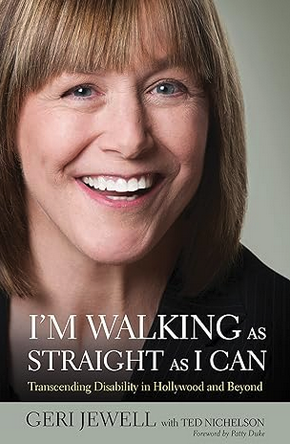
Exposing real pain, unstoppable perseverance, and unquestionable faith in the human spirit, this autobiography offers a true glimpse beyond actress Geri Jewell’s public image as a one-dimensional hero. Born with cerebral palsy, Jewell made history when she became the first person with a disability cast in a recurring role on American television in The Facts of Life, and in the years that followed she experienced a string of other successes, including a performance at the White House and a role on HBO’s Deadwood. But along with such accomplishments, this personal story also depicts some of the less-than-rosy events that happened behind closed doors during her initial climb to fame ― among them, her release from The Facts of Life; her manager’s embezzlement of the money she made on the show; and her struggle with chronic pain, despair, and a fear of revealing her true sexual identity.
Link to the Kindle version: https://amzn.to/3SD7jOi
Link to the paper version: https://amzn.to/3ODcYD2
Link to WorldCat for university students/staff and libraries: https://search.worldcat.org/title/719388644
Funny, You Don’t Look Autistic: A Comedian’s Guide to Life on the Spectrum
by Michael McCreary (Author)
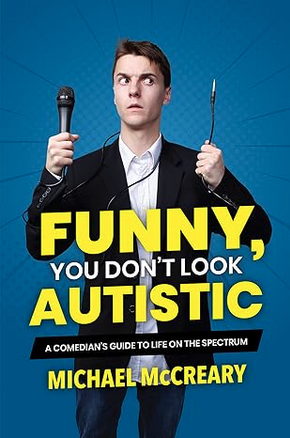
Like many others on the autism spectrum, 20-something stand-up comic Michael McCreary has been told by more than a few well-meaning folks that he doesn’t “look” autistic. But, as he’s quick to point out in this memoir, autism “looks” different for just about everyone with Autism Spectrum Disorder (ASD). Diagnosed with ASD at age five, McCreary got hit with the performance bug not much later. During a difficult time in junior high, he started journaling, eventually turning his pain e into something empowering—and funny. He scored his first stand-up gig at age 14, and hasn’t looked back. This unique and hilarious #OwnVoices memoir breaks down what it’s like to live with autism for readers on and off the spectrum. Candid scenes from McCreary’s life are broken up with funny visuals and factual asides. Funny, You Don’t Look Autistic is an invaluable and compelling read for young readers with ASD looking for voices to relate to, as well as for readers hoping to broaden their understanding of ASD.
Link to the Kindle version: https://amzn.to/3ukgP0Z
Link to the paper version: https://amzn.to/49voyIs
Link to WorldCat for university students/staff and libraries: https://search.worldcat.org/title/1080210076
What the **** is Normal?!
by Francesca Martinez (Author)
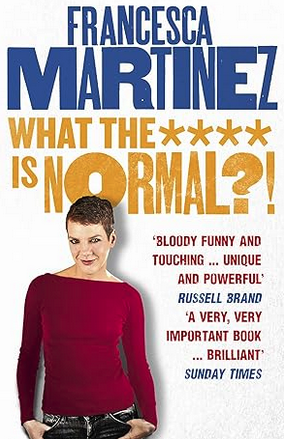
If you grow up in a world where wrinkles are practically illegal, going bald is cause for a mental breakdown, and women over size zero are encouraged to shoot themselves (immediately), what the hell do you do if you’re, gasp … DISABLED? Whatever body you’re born into, the pressure to be normal is everywhere. But have you ever met a normal person? What do they look like? Where do they live? What do they eat for breakfast? And what the **** does normal mean anyway? This is the award-winning wobbly comedian Francesca Martinez’s funny, personal, and universal story of how she learned to stick two shaky fingers up to the crazy expectations of a world obsessed with being ‘normal’.
Link to the Kindle version: https://amzn.to/4bxaShO
Link to the paper version: https://amzn.to/4998PPv
Link to WorldCat for university students/staff and libraries: https://search.worldcat.org/title/911002674
Theatres of Learning Disability: Good, Bad, or Plain Ugly? 2015th Edition
by Matt Hargrave (Author)
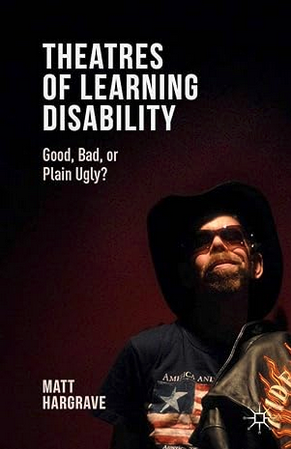
Winner of the TaPRA New Career Research in Theatre/Performance Prize 2016. This is the first scholarly book to focus exclusively on theatre and learning disability as theatre, rather than advocacy or therapy. Hargrave provocatively realigns the – hitherto unvoiced – assumptions that underpin such practice and proposes that learning disabled artists have earned the right to full critical review.
Link to the Kindle version: https://amzn.to/4bwReCu
Link to the paper version: https://amzn.to/4bveQYm
Link to WorldCat for university students/staff and libraries: https://search.worldcat.org/title/911265717
Disability in Film and Literature
by Nicole Markotić (Author)
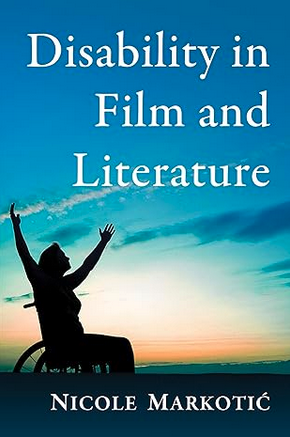
Literary and filmic depictions of the disabled reinforce an “ableist” ideology that classifies bodies as normal or abnormal–positive or negative. Disabled characters are often represented as aberrant or evil and are isolated or incarcerated. This book examines language in film, fiction and other media that perpetuates the representation of the disabled as abnormal or problematic. The author looks at depictions of disability–both disparaging and amusing–and discusses disability theory as a framework for reconsidering “normal” and “abnormal” bodies.
Link to the Kindle version: https://amzn.to/48cDdXX
Link to the paper version: https://amzn.to/49voSXG
Link to WorldCat for university students/staff and libraries: https://search.worldcat.org/title/933438454
Theatre and Disability
by Petra Kuppers (Author)
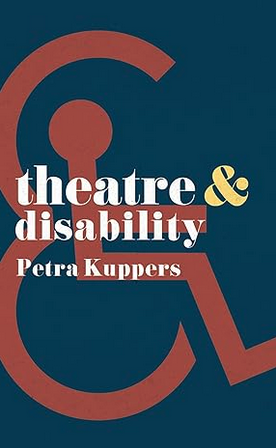
This succinct and engaging text examines the complex relationship between theatre and disability, bringing together a wide variety of performance examples in order to explore theatrical disability through the conceptual frameworks of disability as spectacle, narrative, and experience. Accessible and affordable, this is an ideal resource for theatre students and lovers everywhere.
Link to the Kindle version: https://amzn.to/48dEJJo
Link to the paper version: https://amzn.to/4bBbq6v
Link to WorldCat for university students/staff and libraries: https://search.worldcat.org/title/968647985
Reasons to be Graeae: A work in progress
by Jenny Sealey (Author), Paul Sirett (Contributor)
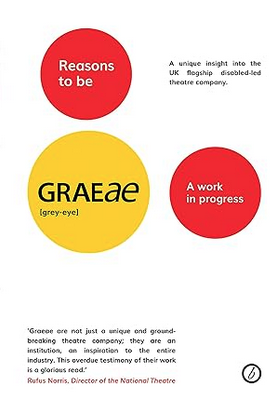
Graeae has been a force for change in world-class theatre since it was founded in 1980, placing D/deaf and disabled actors centre stage and challenging preconceptions. A work in progress contains the full script of Reasons to be cheerful, a brief history of the company, analysis and extracts from their previous shows, memories of Graeae from previous collaborators, including Jack Thorne, Jo Clifford, Kaite O’Reilly and Jonathan Meth, and a host of images.
Link to the Kindle version: https://amzn.to/3HXmKMB
Link to the paper version: https://amzn.to/3HULSU7
Link to WorldCat for university students/staff and libraries: https://search.worldcat.org/title/1033607155
Multidisciplinary
Crip Kinship: The Disability Justice and Art Activism of Sins Invalid
by Shayda Kafai (Author)
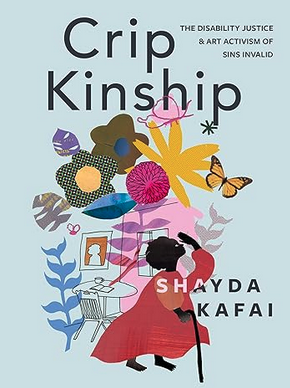
In recent years, disability activism has come into its own as a vital and necessary means to acknowledge the power and resilience of the disabled community, and to call out ableist culture wherever it appears. Crip Kinship explores the art-activism of Sins Invalid, a San Francisco Bay Area-based performance project, and its radical imaginings of what disabled, queer, trans, and gender nonconforming bodyminds of color can do: how they can rewrite oppression, and how they can gift us with transformational lessons for our collective survival. Grounded in their Disability Justice framework, Crip Kinship investigates the revolutionary survival teachings that disabled, queer of color community offers to all our bodyminds. From their focus on crip beauty and sexuality to manifesting digital kinship networks and crip-centric liberated zones, Sins Invalid empowers and moves us toward generating our collective liberation from our bodyminds outward.
Link to the Kindle version: https://amzn.to/42zQB7e
Link to the paper version: https://amzn.to/3utlde1
Link to WorldCat for university students/staff and libraries: https://search.worldcat.org/title/1249556734
How Does Disability Performance Travel?: Access, Art, and Internationalization (Routledge Series in Equity, Diversity, and Inclusion in Theatre and Performance)
by Christiane Czymoch (Editor), Kate Maguire-Rosier (Editor), Yvonne Schmidt (Editor)
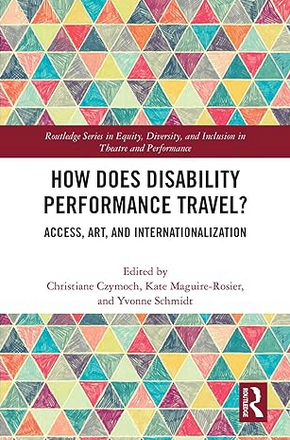
This edited collection investigates the myriad ways in which disability performance travels in a globalized world. Disability arts festivals are growing in different parts of the world; theatre and dance companies with disabled artists are increasingly touring and collaborating with international partners. At the same time, theatre spaces are often not accessible, and the necessity of mobility excludes some disabled artists from being part of an international disability arts community. How does disability performance travel, who does not travel – and why? What is the role of funding and producing structures, disability arts festivals, and networks around the world? How do the logics of international (co-)producing govern the way in which disability art is represented internationally? Who is excluded from being part of a touring theatre or dance company, and how can festivals, conferences, and other agents of a growing disability culture create other forms of participation, which are not limited to physical co-presence? This study will contextualize disability aesthetics, arts, media, and culture in a global frame, yet firmly rooted in its smaller national, state and local community settings and will be of great interest to students and scholars in the field.
Link to the Kindle version: https://amzn.to/3UA60lS
Link to the paper version: https://amzn.to/3SyivvQ
Link to WorldCat for university students/staff and libraries: https://search.worldcat.org/title/1401666065
Electric Bodies – Travels In Life History: Personal Stories of the Emergence of the Disability Arts Movement
by Allan Sutherland (Author), Colin Hambrook (Illustrator)
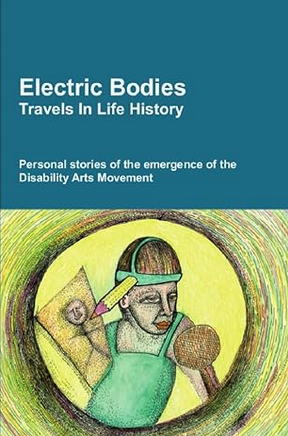
Electric Bodies: Travels In Life History is a selection of transcription poetry by Allan Sutherland with illustrations by Colin Hambrook. It is based on interviews with leading disabled artists Tony Heaton OBE, Mat Fraser, Katherine Araniello, Julie McNamara, Jess Thom, Robin Surgeoner, Vici Wreford-Sinnott and Colin Hambrook 182-page book with illustrations.
Link to the Kindle version: https://amzn.to/49xQX0z
No paper version
No WorldCat link
Disability Culture and Community Performance: Find a Strange and Twisted Shape 2011th Edition
by Petra Kuppers (Author)
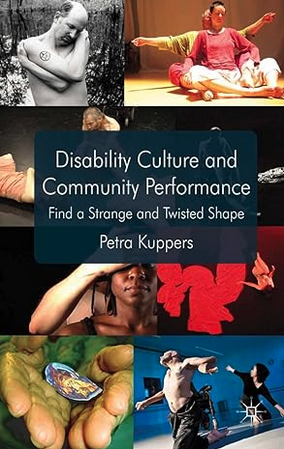
Performances in hospices and on beaches; cross-cultural myth making in Wales, New Zealand and the US; communal poetry among mental health system survivors: this book, now in paperback, presents a senior practitioner/critic’s exploration of arts-based research processes sustained over more than a decade – a subtle engagement with disability culture.
Link to the Kindle version: https://amzn.to/3UzQFly
Link to the paper version: https://amzn.to/3Uxz9y7
Link to WorldCat for university students/staff and libraries: https://search.worldcat.org/title/743800764
Freak Show: Presenting Human Oddities for Amusement and Profit
by Robert Bogdan (Author)
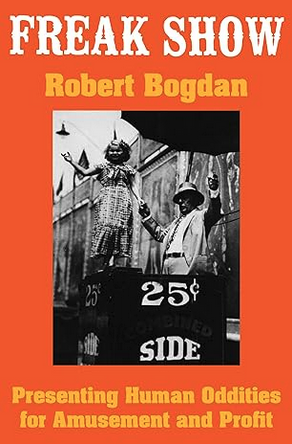
This cultural history of the travelling freak show in America chronicles the rise and fall of the industry as attitudes about disability evolved. From 1840 until 1940, hundreds of freak shows crisscrossed the United States, from the smallest towns to the largest cities, exhibiting their casts of dwarfs, giants, Siamese twins, bearded ladies, savages, snake charmers, fire eaters, and other oddities. By today’s standards such displays would be considered cruel and exploitative—the pornography of disability. Yet for one hundred years the freak show was widely accepted as one of America’s most popular forms of entertainment. Robert Bogdan’s fascinating social history brings to life the world of the freak show and explores the culture that nurtured and, later, abandoned it. In uncovering this neglected chapter of show business, he describes in detail the flimflam artistry behind the shows, the promoters and the audiences, and the gradual evolution of public opinion from awe to embarrassment. Freaks were not born, Bogdan reveals; they were manufactured by the amusement world, usually with the active participation of the freaks themselves. Many of the “human curiosities” found fame and fortune, until the ascent of professional medicine transformed them from marvels into pathological specimens.
Link to the Kindle version: https://amzn.to/3wddEbW
Link to the paper version: https://amzn.to/494Hdee
Link to WorldCat for university students/staff and libraries: https://search.worldcat.org/title/17300686
Disability Works: Performance After Rehabilitation (Performance and American Cultures)
by Patrick McKelvey (Author)
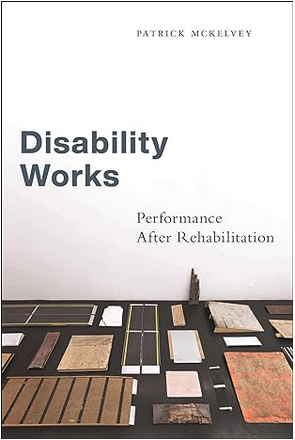
A cultural history of disability, performance, and work in the modern United States. In 1967, the US government funded the National Theatre of the Deaf, a groundbreaking rehabilitation initiative employing deaf actors. This project aligned with the postwar belief that transforming bodies, minds, aesthetics, and institutions could liberate disabled Americans from economic reliance on the state, and demonstrated the growing optimism that performance could provide job opportunities for people with disabilities. Disability Works offers an original cultural history of disability and performance in modern America, exploring rehabilitation’s competing legacies. The book highlights an unexpected alliance of rehabilitation professionals, deaf teachers, policy makers, disability activists, queer artists, and religious leaders who championed performance’s rehabilitative potential. At the same time, some disabled artists imagined a different political itinerary for theatrical practice. Rather than acquiescing to the terms of productive citizenship, these artists recuperated rehabilitation as a creative resource for imagining and building a world beyond work. Using previously unexplored archives, Disability Works portrays the history of disabled Americans’ performance labor as both a national aspiration and a national problem. The book reveals how disabled artists and activists ingeniously used rehabilitative resources to fuel their performance practices, breaking free from the grasp of rehabilitation and fostering more just institutions.
Link to the Kindle version: https://amzn.to/3w8iMxX
Link to the paper version: https://amzn.to/3ul81rJ
Link to WorldCat for university students/staff and libraries: https://search.worldcat.org/title/1400973499
Interdependent Magic: Disability Performance in Canada
by Jessica Watkin (Editor)
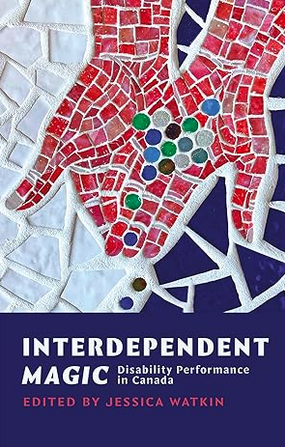
Interdependent Magic: Disability Performance in Canada is a collection of plays and interviews by, for, and about Disabled theatre artists that invites readers into the magical worlds of Disability arts culture. The book features four plays as well as an interview with artist Niall McNeil. In Smudge by Alex Bulmer, a woman details her journey toward Blindness, mourning what she loses and discovering what her other senses provide. Access Me by Boys in Chairs Collective is a celebration of sex and Disability, providing an all-access safe space to spin around. Antarctica by Syrus Marcus Ware imagines a world where racialized people have survived multiple catastrophes and must begin terraforming a new colony. And in Deafy by Chris Dodd, a Deaf public speaker takes the audience on an unexpected journey of discovering what it really means to belong.
Link to the Kindle version: https://amzn.to/3SSbdUS
Link to the paper version: https://amzn.to/42yQety
Link to WorldCat for university students/staff and libraries: https://search.worldcat.org/title/1302309493
Inside Deaf Culture
by Carol Padden (Author), Tom Humphries (Author)
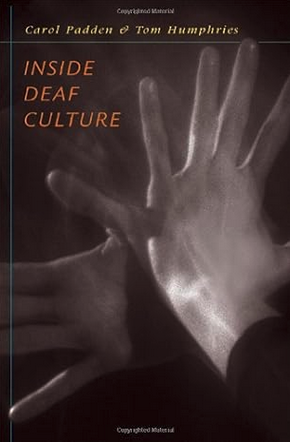
In this absorbing story of the changing life of a community, the authors of Deaf in America reveal historical events and forces that have shaped the ways that Deaf people define themselves today. Inside Deaf Culture relates Deaf people’s search for a voice of their own, and their proud self-discovery and self-description as a flourishing culture. Padden and Humphries show how the nineteenth-century schools for the deaf, with their denigration of sign language and their insistence on oralist teaching, shaped the lives of Deaf people for generations to come. They describe how Deaf culture and art thrived in mid-twentieth century Deaf clubs and Deaf theatre, and profile controversial contemporary technologies. Most triumphant is the story of the survival of the rich and complex language American Sign Language, long misunderstood but finally recently recognized by a hearing world that could not conceive of language in a form other than speech. In a moving conclusion, the authors describe their own very different pathways into the Deaf community, and reveal the confidence and anxiety of the people of this tenuous community as it faces the future.
Link to the Kindle version: https://amzn.to/3T3fJAl
Link to the paper version: https://amzn.to/3ODaip2
Link to WorldCat for university students/staff and libraries: https://search.worldcat.org/title/432709336
